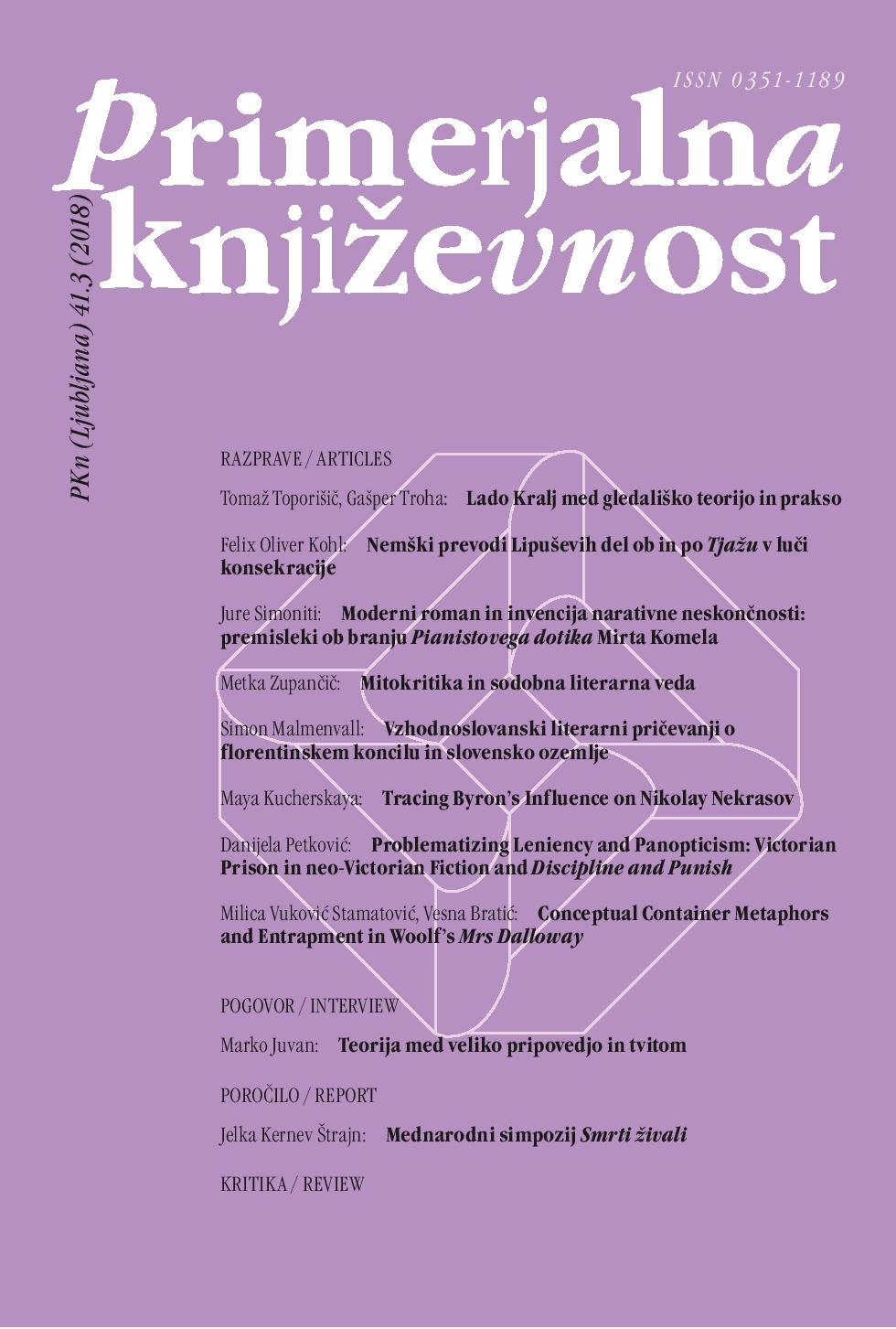Conceptual Container Metaphors and Entrapment in Woolf’s Mrs Dalloway
Keywords:
English literature, Woolf, Virginia, cognitive theory of metaphor, conceptual metaphor, rapid conceptualisation, delayed conceptualisation, sustained metaphor, entrapment, containmentAbstract
This paper deals with conceptual container metaphors in the novel Mrs Dalloway by Virginia Woolf. The study is based on the conceptual metaphor theory (Lakoff and Johnson, Metaphors We Live By), as well as on its extended versions which have contributed to the study of conceptual metaphor in literary texts, as proposed by Werth (Text Worlds) and Tsur (“Lakoff’s Roads”). The focus is on container metaphors suggesting entrapment and containment, identified both through rapid conceptualisation (identification by means of the immediate context) and its delayed counterpart (metaphors discovered bearing in mind the entire text of the novel). We argue that container metaphors in the novel combine into a metaphoric web permeating the entire body of the novel and defining all the characters. This undercurrent of metaphors helps create an atmosphere of entrapment.References
Abbott, H. Porter. “Cognitive Literary Studies: The ‘Second Generation’; The Work of Fiction: Cognition, Culture, and Complexity.” Poetics Today 27.4 (2006): 711–722.
Beer, Gillian. Virginia Woolf: The Common Ground. Edinburgh: Edinburgh University Press, 1996.
Charles, Marilyn. “The Waves: Tensions between Creativity and Containment in the Life and Writings of Virginia Woolf.” The Psychoanalytic Review 91.1 (2004): 71–97.
Fauconnier, Gilles. Mapping in Thought and Language. Cambridge: Cambridge University Press, 1997.
Freeman, Margaret H. “Cognitive Linguistic Approaches to Literary Studies: State of the Art in Cognitive Poetics.” The Oxford Handbook of Cognitive Linguistics. Eds. Irk Geeraerts and Hubert Cuyckens. Oxford: Oxford University Press, 2009. 1175–1202.
Gibbs, Raymond W. The Poetics of Mind: Figurative Thought, Language and Understanding. Cambridge: Cambridge University Press, 1994.
Harbus, Antonina. “Thinking in Metaphors: Figurative Language and Ideas on the Mind.” Sydney Studies in English 30 (2004): 3–20.
Harker, James. “Misperceiving Virginia Woolf.” Journal of Modern Literature 34.2 (2011): 1–21.
Henke, Suzette A. “Mrs Dalloway: The Communion of Saints.” New Feminist Essays on Virginia Woolf. Ed. Jane Marcus. Lincoln: University of Nebraska Press, 1981. 125–147.
Hobbs, Jerry R. Literature and Cognition. Stanford: Centre for the Study of Language and Information (CSLI), 1990.
Kövecses, Zoltán. Emotion Concepts. New York: Springer Science & Business Media, 2012.
– – –. Metaphor in Culture: Universality and Variation. Cambridge: Cambridge University Press, 2005.
Lakoff, George. Women, Fire, and Dangerous Things. Chicago and London: University of Chicago Press, 1987.
Lakoff, George, and Mark Johnson. Metaphors We Live By. Chicago and London: University of Chicago Press, 1980.
– – –. Philosophy in the Flesh: The Embodied Mind and Its Challenge to Western Thought. New York: Basic Books. 1999.
Langacker, Ronald W. Foundation of Cognitive Grammar. Vol. I: Theoretical Prerequisites. Stanford, CA: Stanford University Press, 1987.
McVicker, Jeanette. “Postcolonial Approaches.” Palgrave Advances in Virginia Woolf Studies. Ed. Anna Snaith. Houndmills, Basingstoke, Hampshire: Palgrave Macmillan, 2007. 209–226.
Richardson, Alan and Francis F. Steen. “Literature and the Cognitive Revolution: An Introduction.” Poetics Today 23.1 (2002): 1–8.
Schröder, Leena K. “‘Reflections in a Motor Car’: Virginia Woolf’s Phenomenological Relations of Time and Space.” Locating Woolf: The Politics of Space and Place. Eds. Anna Snaith and Michael H. Whitworth. Houndmills, Basingstoke, Hampshire: Palgrave Macmillan, 2007. 131-147.
Scott, Bonnie King. “The Word Split Its Husk: Woolf’s Double Vision of Modernist Language.” MFS Modern Fiction Studies 34.3 (1988): 371–385.
Semino, Elena, and Gerard Steen. “Metaphor in Literature.” The Cambridge Handbook of Metaphor and Thought. Ed. Raymond Gibbs. Cambridge: Cambridge University Press, 2008. 232–246.
Squier, Susan. “Mirroring and Mothering: Reflections on the Mirror Encounter Metaphor in Virginia Woolf’s Works.” Twentieth Century Literature 27.3 (1981): 272–288.
Taylor, John R. Cognitive Grammar. Oxford: Oxford University Press, 2002.
Tsur, Reuven. “Lakoff’s Roads Not Taken.” Pragmatics and Cognition 7 (1999): 339–359.
– – –. “‘Oceanic’ Dedifferentiation and Poetic Metaphor.” Journal of Pragmatics 12 (1988): 711–724.
Vermorel, Henri, and Madeleine Vermorel, eds. Sigmund Freud et Rolland Romain : correspondance 1923–1936. Paris: Presses Universitaires de France, 1993.
Vorobyova, Olga. “‘The Mark on the Wall’ and Literary Fancy: A Cognitive Sketch.” Cognition and Literary Interpretation in Practice. Eds. Bo Petterson, Merja Polvinen and Harri Veivo. Helsinki: Helsinki University Press, 2005. 201–217.
Werth, Paul. Text Worlds: Representing Conceptual Space in Discourse. London: Longman, 1999.
– – –. “The Linguistics of Double-Vision.” Journal of Literary Semantics 6.1 (1977): 3–28.
Wolf, Werner. “Chance in Fiction as a Privileged Index of Implied Worldviews: A Contribution to the Study of the World-Modelling Functions of Narrative Fiction.” Theorizing Narrativity 12 (2008): 165–210.
Woolf, Virginia. A Writer’s Diary: Being Extracts from the Diary of Virginia Woolf. San Diego: Mariner Book, 2003.
– – –. Collected Novels of Virginia Woolf. Houndmills, Basingstoke, Hampshire: Macmillan, 1992. 165–210.


